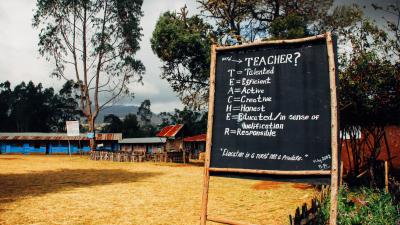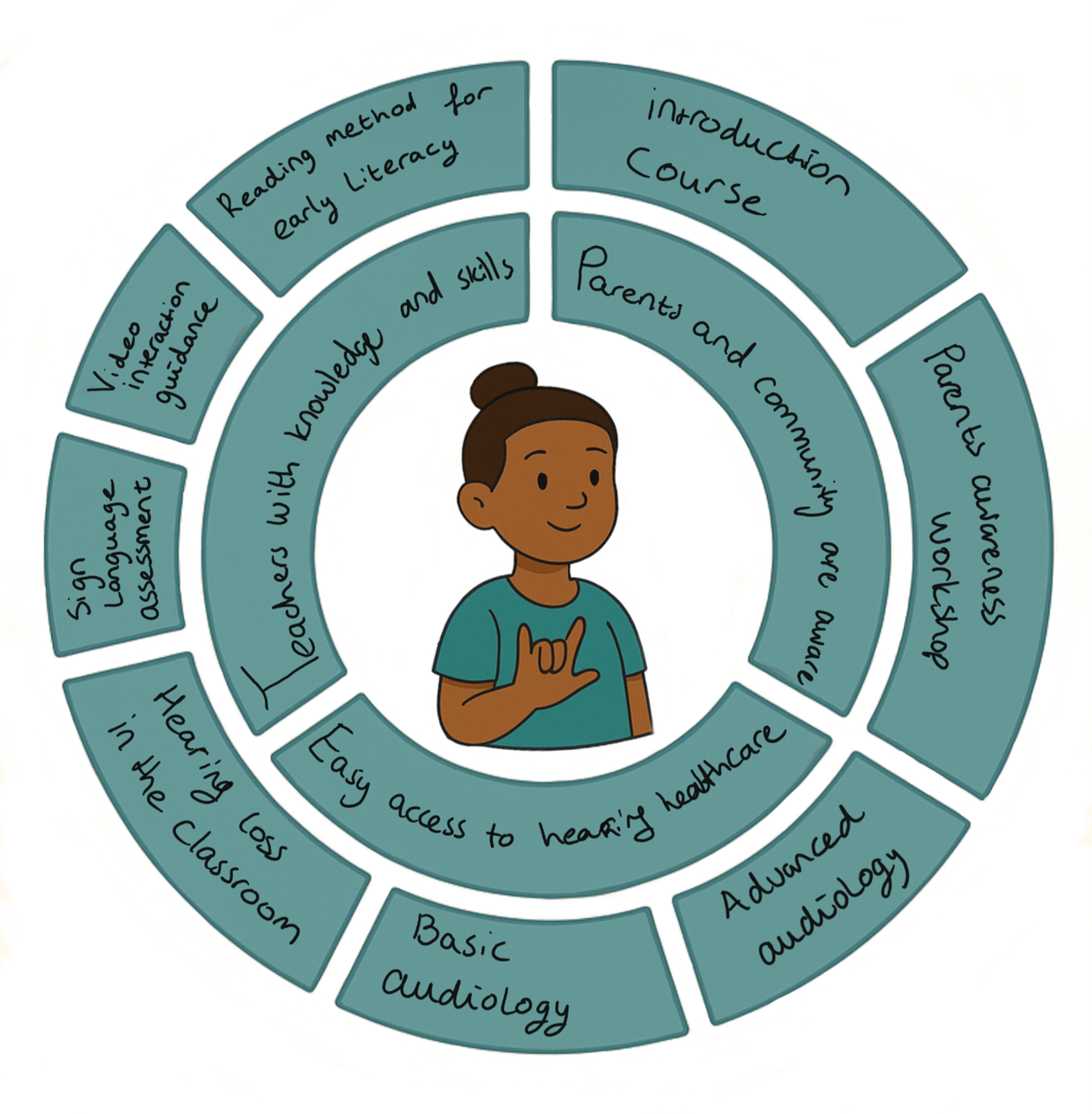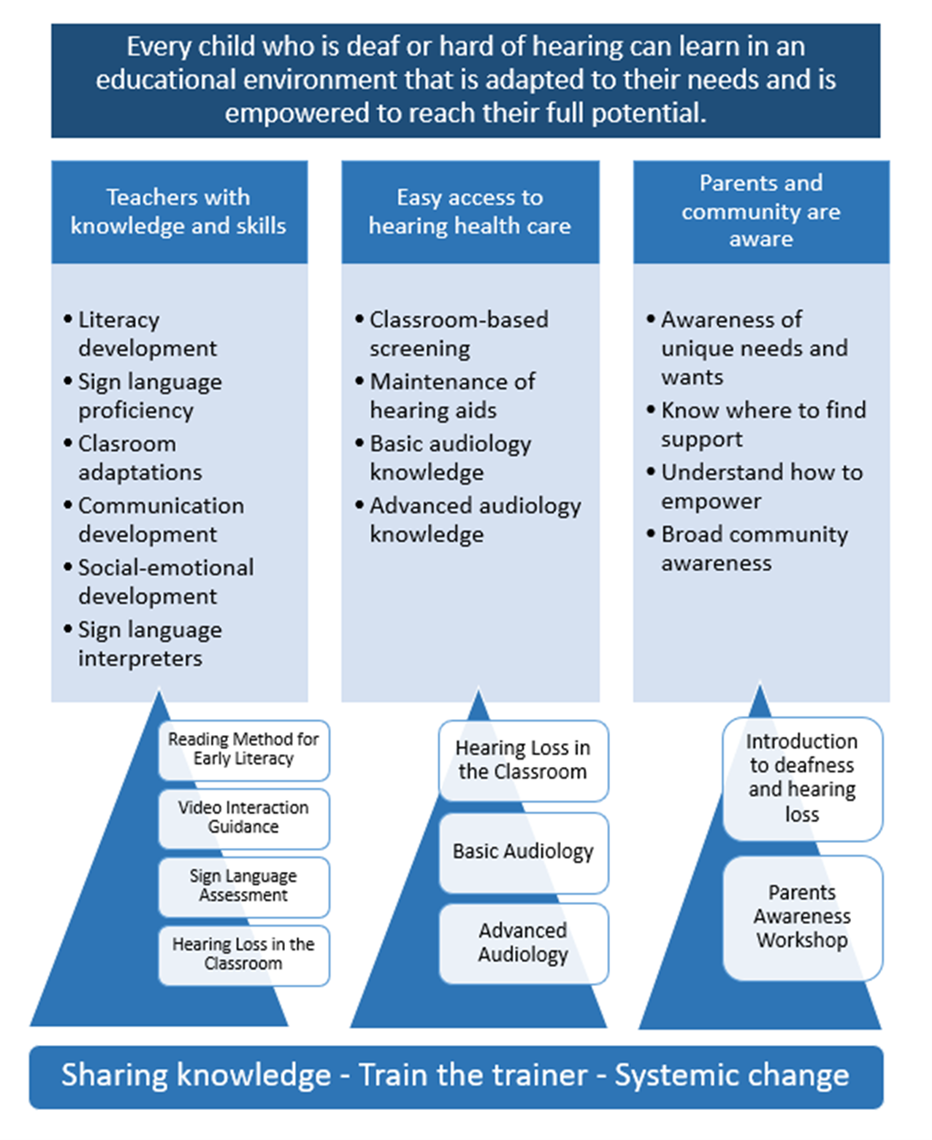Kentalis International Foundation believes that every person should have their right to education and care attained, regardless of disability or any other factor. Therefore we exchange our knowledge worldwide, with the aim to enable deaf and hard-of-hearing children and adults to participate in society and achieve their full potential.
Mission
Our mission is to contribute to a world where every child who is deaf or hard of hearing can learn in an educational environment that is adapted to their needs and is empowered to reach their full potential. Through knowledge sharing, local capacity building and systemic change, we work to make inclusion of children who are deaf or hard of hearing a reality.
Vision
We envision a future where every child who is deaf or hard of hearing has the opportunity to go to school, has equal access to quality education and develop the skills needed to thrive and participate fully in society.

Our Theory of Change
Our Theory of Change guides us in our work. This framework shows our mission, how we work and what outcomes we envision. Click on the picture to see an enlarged version, or read the extensive Theory of Change below.
Read our full Theory of Change here.

To achieve our mission, we, among other things, provide training for professionals in our partner countries. Read more about the course programs we provide.
In relation to the United Nations CRPD
We find it important to recognize that we work in the context of the United Nations Convention on the Rights of Persons with Disabilities (CRPD). In line with the CRPD, we:
- Recognize that persons with disabilities have a right to full and equal participation in education and in their communities. Therefore we aim to contribute to the training of teachers and/or other professional staff in the appropriate teaching methods and techniques, including the option of Sign Language, tactile communication, sign supported speech and visualization techniques, etc. We do this in order to ensure that education can be delivered in the most appropriate languages and modes and means of communication for the individual and in an environment that maximizes academic and social development (UNCRPD art. 24.3).
- Recognize that persons with disabilities have the right to live independently and participate fully in all aspects of life, for which access to information is crucial. Therefore we aim to contribute to the successful use of hearing aids and hearing implants by training relevant people in the medical and/or educational sector in areas such as (early) screening and diagnostics, (early) rehabilitation, classroom acoustics, and educational audiology. Furthermore, we promote professional training and availability of Sign Language interpreters, including those trained in using tactile communication and interpreting for persons who are deafblind and other appropriate forms of assistance. (UNCRPD art. 9).
- Recognize that people with disabilities have the right to be included in decision-making and programs that concern them. Therefore we aim to include the relevant DPOs (representative organizations or groups of persons with disabilities) in all stages of our programs to the best of our abilities (UNCRPD preamble. (o)).
- Recognize that persons with disabilities have a right to full and equal participation in cultural life, leisure, recreation, and sport. Therefore we aim to contribute to awareness-raising concerning the abilities of persons with disabilities, and the opportunities for bridging communication barriers. Hereto we may offer, together with our partners, training to hearing persons (professionals and/or parents) on options of communication with persons who are hard-of-hearing, deaf, deafblind, or who have other disabilities that affect communication.
- Acknowledge Sign Language and deaf culture as being the cultural and linguistic identity of deaf people (UNCRPD art. 30.1 and 30.4). We also acknowledge the freedom of deaf and hard-of-hearing people to make individual choices and/or have preferences of socio-cultural belonging concerning language and culture.
- Contribute - as an organization based in the Netherlands - to the obligation within international development cooperation in investing in capacity-building. Hereto we share information, build networks of professionals, exchange experiences, develop and implement training programs and learn from each other through best practices (UNCRPD art. 32.b)
We acknowledge that every region or country has its own policies, social background, diverse culture, and specific challenges. Our intention is to discover together with our partners the right setting for knowledge exchange and adapt the Kentalis expertise accordingly without compromising quality standards. We are open and aim to work with all stakeholders involved in order to achieve the best possible results. For sustainable learning, we primarily work through a train-the-trainer principle and aim to embed our programs in existing structures.
